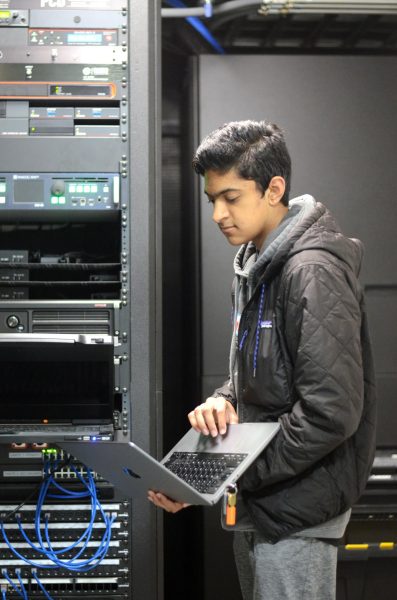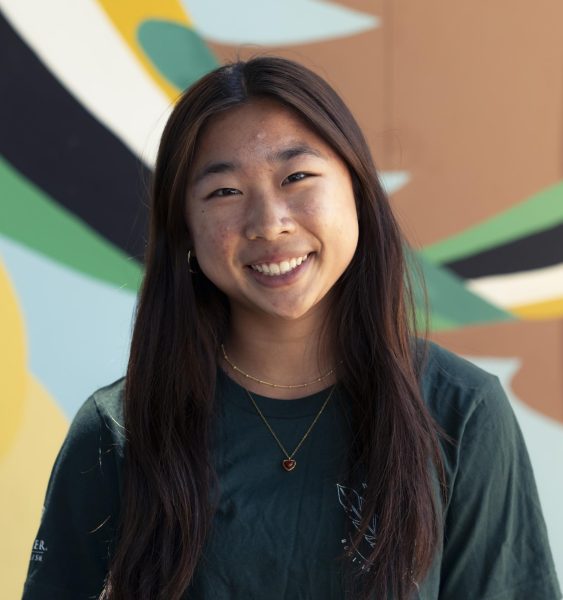
A smattering of applause echoes through the dark theater as a lone eleven year old strides confidently across the stage with a proud smile on his face. The enormous projector screen hanging behind him displays images of his most recent product, a smartwatch programming kit, as the young entrepreneur launches into a presentation outlining his steps to success.
As a young entrepreneur, Omkar Govil-Nair (12) discovered inspiration in the diversity of problem solvers, setting him on a creative journey that led him to share this success story at such a young age.
At the age of four, Omkar visited Maker Faire, an annual convention of enthusiastic innovators across several fields, from robotics to arts and crafts. Awestruck by the variety of exhibits and diversity of presenters, he found inspiration in the other young designers who showed him that making could have an impact at any age or scale.
Omkar’s experience at the convention left a persisting impact on him, igniting a passion for innovation that has continued to this day. As he reminisces about that formative encounter, he considers the essence of the Maker movement and the abundance of resources available to aspiring creators.
“One of the best parts of the Maker movement is that all the resources are out there,” Omkar said. “People are out there to help you, so you don’t need any classes or anything. You can figure it out yourself.”
From that moment, Omkar developed a deep curiosity into the world of making and began teaching himself the basics of engineering and technology. His perseverance and eagerness to solve problems regarding issues that affect those around him, such as education and efficiency, would propel him to create a product that would bring him back to Maker Faire as a presenter himself. Even without formal training on how to conceive his visions, Omkar discovered success through his own exploration.
Upon watching his friends and classmates learn to code using block coding platforms such as Scratch, Omkar felt motivated to build O Watch, an interactive kit that allows users to design their own smartwatches. Omkar hoped that through his project, he could give others the same engaging experience he had while learning programming. After two years of development, he launched his product and set up a promotional booth at Maker Faire. With the help of a Kickstarter crowdfunding campaign, Omkar shipped O Watch kits to consumers worldwide.
Reflecting on his first process, Omkar emphasized the art of learning and the pivotal role of prototyping. He recognized his ability to swiftly adapt to new fields and embrace fresh challenges, underlining the importance of resourcefulness and collaboration, fundamental aspects of his project’s development.
“The biggest one is just learning how to learn,” said Omkar. “If there’s any new field that I want to learn about or build in, within a couple of weeks I can pick that up and start doing that. I think it goes back to the prototyping process as well, in terms of understanding how to find resources and how to find people that can help you take the steps to build whatever you need to build.”
While O Watch is one of Omkar’s large-scale projects, he constantly seeks to identify difficulties in his own life, as well as in his friend’s and family’s. Whether it is a laser-cut wallet to hold his accumulating cards or his most recent ambitious project, a program using generative AI to compose unbiased news headlines from a larger array of sources, he blends creativity and practicality to address these challenges, making a positive impact on the world through his work.
Upper school U.S. History teacher James Tate also notes Omkar’s love for learning, citing many thoughtful conversations they have about everything from politics to economics. Tate admires Omkar’s ability to explore beyond the surface level and build a deeper understanding of the causes and effects of people’s actions. Upon hearing about Omkar’s latest news aggregator project, Tate was immediately impressed, and drew a connection between this project and Omkar’s fundamental way of thinking.
“Not only is [the generative AI news model] a really cool thing to be working on, it’s so necessary,” Tate said. “That not only points to his interest in technology and current events, but it shows that he’s thinking about: what are the problems with the way we think about these things? And one of the big problems is the way we present information.”
Omkar strives to use his innovation skills to not only build products that have the potential to improve the lives of others, but also implement them in real life. Kabir Ramzan (12), who met Omkar through Harker’s Robotics team, reflected on his passion for inspiring others and sparking positive change through his prototypes.
“He’s really thinking, how can I build these solutions using technology, and then how can I convince other people that those solutions are important,” Kabir said. “It’s a very unique combination of skills.
Omkar’s ability to connect with others along with his drive to dive deep beyond the surface of any topic spills over into other aspects of his life, which Harker Robotics teammate Benjamin Xia (10) greatly admires. While Omkar came off as reserved to Benjamin upon their first meeting, when they began discussing his interests, he was full of ideas and lit up with passion, his widespread knowledge surfacing.
“He doesn’t have a lot to say at first,” Benjamin said. “But once you get to know him, he knows a lot more than you think he does.”
As a maker, it is often an obstacle that sparks a new idea for Omkar. Furthermore, he notices that his experiences push him to reflect on his other involvements as well.
“I try to look for problems,” Omkar said, “but the bigger thing is that [making] really made me think about everything that I’m doing. Why do I want to do that, or why am I spending my time doing that? The Robotics Club, for example, sure, I do it because it’s fun and I get to hang out with friends, but the project that we’re working on is also impactful beyond just our team.”
For Omkar, while creating a product may take him anywhere from a few hours to many months, it is often the steps required to reach the end point that he finds the most rewarding. Always seeking to improve upon his work, Omkar remains persistent and insatiable curious, allowing himself to find joy in smaller achievements along the way.
“You learn so much in the process, whether it’s a skill like 3D printing, or machining, or how to use AI,” Omkar said. “You also meet a lot of people who are doing similar things, or who are interested in what you’re doing.That all is much more meaningful than anything that you’ve built yourself because no project is ever really finished. You can’t reach a perfect outcome.”


















![“[Building nerf blasters] became this outlet of creativity for me that hasn't been matched by anything else. The process [of] making a build complete to your desire is such a painstakingly difficult process, but I've had to learn from [the skills needed from] soldering to proper painting. There's so many different options for everything, if you think about it, it exists. The best part is [that] if it doesn't exist, you can build it yourself," Ishaan Parate said.](https://harkeraquila.com/wp-content/uploads/2022/08/DSC_8149-900x604.jpg)




![“When I came into high school, I was ready to be a follower. But DECA was a game changer for me. It helped me overcome my fear of public speaking, and it's played such a major role in who I've become today. To be able to successfully lead a chapter of 150 students, an officer team and be one of the upperclassmen I once really admired is something I'm [really] proud of,” Anvitha Tummala ('21) said.](https://harkeraquila.com/wp-content/uploads/2021/07/Screen-Shot-2021-07-25-at-9.50.05-AM-900x594.png)







![“I think getting up in the morning and having a sense of purpose [is exciting]. I think without a certain amount of drive, life is kind of obsolete and mundane, and I think having that every single day is what makes each day unique and kind of makes life exciting,” Neymika Jain (12) said.](https://harkeraquila.com/wp-content/uploads/2017/06/Screen-Shot-2017-06-03-at-4.54.16-PM.png)








![“My slogan is ‘slow feet, don’t eat, and I’m hungry.’ You need to run fast to get where you are–you aren't going to get those championships if you aren't fast,” Angel Cervantes (12) said. “I want to do well in school on my tests and in track and win championships for my team. I live by that, [and] I can do that anywhere: in the classroom or on the field.”](https://harkeraquila.com/wp-content/uploads/2018/06/DSC5146-900x601.jpg)
![“[Volleyball has] taught me how to fall correctly, and another thing it taught is that you don’t have to be the best at something to be good at it. If you just hit the ball in a smart way, then it still scores points and you’re good at it. You could be a background player and still make a much bigger impact on the team than you would think,” Anya Gert (’20) said.](https://harkeraquila.com/wp-content/uploads/2020/06/AnnaGert_JinTuan_HoHPhotoEdited-600x900.jpeg)

![“I'm not nearly there yet, but [my confidence has] definitely been getting better since I was pretty shy and timid coming into Harker my freshman year. I know that there's a lot of people that are really confident in what they do, and I really admire them. Everyone's so driven and that has really pushed me to kind of try to find my own place in high school and be more confident,” Alyssa Huang (’20) said.](https://harkeraquila.com/wp-content/uploads/2020/06/AlyssaHuang_EmilyChen_HoHPhoto-900x749.jpeg)




Taran • Oct 15, 2024 at 10:27 pm
I love you omkar!!!!